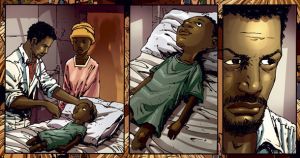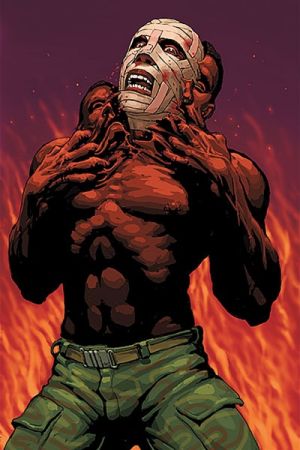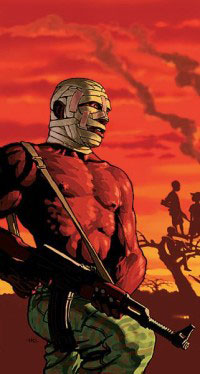Interviews
Unknown Soldier: The Dysart Interview Pt. 3
By
Beth Davies-Stofka
February 25, 2011 - 04:19
In yesterday's installment of our multi-part interview with writer Joshua Dysart, we explored the creative origins of Dr. Moses Lwanga, the main character in Dysart's 2008 revival of Unknown Soldier. Today, we discuss Lwanga's sanity, and what it might mean to question it.
I’d love to talk about Moses Lwanga’s sanity. [Dysart laughs out loud] I don’t know what to make of his state of mind. I mean, I don’t think I could hold it together if I went through what he did. I can totally see him losing it, hearing voices, cutting his own face, it’s a dreadful moment and completely understandable. Is he actually out of his mind?
We’ve got this device in the narrative where Moses is
colonized. Moses is my physical embodiment of Africa. And part of this is the conflict between the intellect and the desire for peace, but also the violence -- the systemic, deeply-rooted violence. Colonization is a part of that violence. So Moses is colonized. What we’re experiencing with his questionable sanity is kind of a fluctuating state of post-colonialism, where he’s literally struggling for his own identity. And what the voices are, and where they come from, that’s revealed, but I think that ultimately, that’s less important than how Moses struggles to find his true identity – remorseless killer and vigilante, or ultimately pacifistic humanitarian.
So if I had asked you, “Is his state of mind allegorical,” the answer would have been “yes.”
Yes! It’s
all allegorical,
except for his name. [lots of laughter]
To me he has a kind of “cracked” sanity, where you’re just not really sure where he stands. I guess you could say that there’s two extremes in everybody’s life, between sanity and insanity, and most of us live somewhere along a spectrum, and perhaps we slide around a bit.
Absolutely! It’s kind of a positive accident that this turned out to be such a great narrative device. It’s been interesting because now we’ve essentially got a character who, for the most part, you’re not really sure what he’s going to do next. And that’s been really great. But ultimately, it’s really just an extreme example of my own conflict. You know, they asked me to write a war book. I am politically, ideologically and spiritually opposed to the notion of organized conflict. But I myself over the years have had that view challenged. It’s very complex.

|
And so Moses really is, and the book itself is an excuse for me to explore the notion of conflict as a positive thing. And I hope the book asks questions but doesn’t really answer them, because I don’t know the answer. I used to identify myself as a pacifist, but I remember reading a quote where Gandhi said, during WWII (and I’m going to paraphrase and probably butcher it), let the German come into your home, and if he takes the lives of your family, let him take the lives of your family, and this is how we’re going to overcome, is through peace, and you don’t fight. At any cost you don’t fight.
And I don’t know, I think I stopped calling myself a pacifist that day because with all the respect that I have for Gandhi, I don’t agree with that. I don’t agree with when they’re knocking at your door and your family is in danger that you don’t fight back. And if somebody is really truly destabilizing a part of the world, profoundly, deeply, for generations,
systemically destroying that region’s chances for having a better life, maybe the thing to do is to put a bullet in that guy’s head. I don’t know the answer. And so Moses, his two personalities are reflections of my personal internal conflict with the idea of violence as the answer in certain situations.
Ah, so I guess you probably have a sense that for a lot of people who look at the Uganda conflict, that war happens in everybody’s own heart. As in, “I must resist nonviolently, there is no way to peace, peace is the way, and yet I just want to go kill that [insert gross expletive],” you know?
Yeah, yeah, no, exactly! That’s the thing. Kony engenders hatred in the kindest and most gentle of people. It’s amazing!
So what separates Moses from Joseph Kony?
Oh, that’s an excellent question. I don’t know. I really don’t know. That’s an endless discussion. I mean, I guess if I were to defend Moses (and sometimes I don’t feel like defending him), I would say that his intentions are to heal, and not to destroy, but maybe Kony feels that way too. So I can’t really answer that question. I think there are times when Moses is very much like Joseph Kony.
Next time, we’ll discuss religion in
Unknown Soldier. See you Monday!
Last Updated: November 29, 2025 - 16:51



